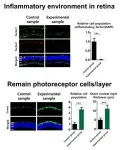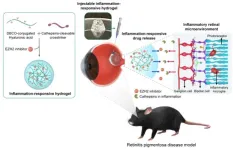(Press-News.org) Elche (Spain), January 22, 2024. Usually, show business depicts viruses, bacteria, and other microorganisms as one of the worst menaces to humankind. Entertainment movies influence the way audiences understand and perceive these topics. Yet, few films accurately portray the science of microbiology and its social implications. Movies and TV series often feature outbreaks of deadly diseases and the efforts of scientists and medical professionals to contain them. However, entertainment movies can also educate the public about the importance and the impact those microorganisms have on our lives. A new publication in FEMS Microbiology Letters provides insights and examples to teach microbiology concepts to undergraduate students. Manuel Sanchez is a Microbiology professor at the Miguel Hernandez University of Elche. He's been using movies in class for many decades. He finds students can learn complex scientific concepts easily when integrated into a story. The expert has recently published a review in FEMS Microbiology Letters to show the relationship between movies and microbiology, from the fight against diseases such as AIDS or tuberculosis to the zombie apocalypse. "Maybe one day the Academy of Motion Picture Arts and Sciences will honor an Oscar award for microbes", writes Sanchez. According to the Internet Movie Database (IMDB), as of June 2023, there were 2,502 titles related to the keyword' virus', 184 related to 'bacteria', and 760 to 'infection'. For example, without viruses, we would not have such cinematic characters as the zombies that try to eat Brad Pitt and his family in "World War Z" or the cool vampires from the "Blade" saga. But are microbes villains, or are they heroes? Although microbes do much more good than harm in nature, this aspect is rarely represented on screen. Professor Sanchez explains that some film productions, especially recent ones, take great care in enrolling scientific advisors to have the most plausible and realistic scripts. However, in most occasions, that situation does not occur, so making a virtue out of necessity, movie goofs such as the scene from "Mission: Impossible II" where a flu virus infects a red blood cell, can be seen as an opportunity to explain the concept and conditions of viral host recognition to undergraduate students. Movies can be used in the classroom in two ways, depending on the time available. Students can watch the whole film as an external activity and then discuss its content in class. Another option is to use clips of selected scenes related to the subject to be addressed. For example, in minute 19 of "Dallas Buyers Club", a medical doctor (Jennifer Garner) explains to her AIDS patient (Matthew McConaughey) what is a double-blind clinical trial. This scene can be used as an introduction to a class about bioethics and/or drug development. Another example is the sequence at minute 74 from the movie "Panic in the Streets", which can be used to explain the 'One Health' concept, thanks to the following dialogue: Community? What community? Do you think you're living in the Middle Ages? Anybody that leaves here can be in any city in the country within 10 hours. I could leave here today and be in Africa tomorrow. And whatever disease I had would go with me… Then think of it when you're talking about communities! We're all in a community…the same one! Professor Sanchez's review can be helpful for teachers looking for such learning material. The paper is organized into three major sections, providing insights and examples of movies and TV/streaming series telling stories involving real diseases, others about the role of scientists, and feature films about the apocalyptic results of microbial infection. The first section is dedicated to the real infectious diseases represented on the screen. Commercial movies are better known to the general public than documentaries, so they could be used to explain the symptoms of the illness and other aspects, such as the care of the sick or the impact of the disease in a particular historical moment or in our current society. For example, in "The African Queen" (John Huston, 1951), Charlie, Humphrey Bogart's character, is bitten by a mosquito and is affected by malaria. Spoiler alert: he survives, unlike Giovanni de Medici in "Il mestiere delle armi" ("The Profession of Arms, Ermanno Olmi, 2001). A second section is dedicated to movies where the protagonists are the scientists and medical doctors who fight against microbial diseases. In this case, the main concepts to be explained are scientific methods and biocontainment measures. For example, "Outbreak" (Wolfgang Petersen, 1995) is so full of scientific mistakes that it's actually amusing to dissect. Also, the stereotype of the scientist has evolved from the solitary, dedicated hero of the 1930s to today's interdependent groups of highly technical researchers. Finally, the last part deals with the films in which microbes manage to defeat humanity, creating a dystopian world. Movies and series like "I Am Legend" (Danny Boyle, 2002), "28 Days Later", or "The Last of Us" (Neil Druckmann and Craig Mazin, 2023) are well known by the public and can be used to explain key concepts in epidemiology and disease transmission but also how to deal with highly stressful situations. Professor Sanchez is a microbiologist and science communicator. He has written several books regarding this subject and articles about microbiology in popular culture for The Conversation.
JOURNAL FEMS Microbiology Letters
DOI https://doi.org/10.1093/femsle/fnad129
ARTICLE TITLE Microbial pathogens in the movies
###
END
It's award season: let's celebrate microbes in movies
A review in FEMS Microbiology Letters by Professor Manuel Sanchez from UMH (Spain) reveals how movies can raise public awareness and appreciation of the world of microbiology
2024-02-14
ELSE PRESS RELEASES FROM THIS DATE:
New treatment developed to dramatically slow down the progression of blindness-causing retinal diseases
2024-02-14
The Korea Institute of Science and Technology (KIST) announced that Dr. Maesoon Im of the Brain Science Institute, together with Prof. Seung Ja Oh of Kyung Hee University and Prof. Kangwon Lee of Seoul National University, successfully incorporated anti-inflammatory drugs into a hydrogel to suppress inflammation in the retina and effectively deliver the drugs to the inflamed area.
Age-related macular degeneration and retinitis pigmentosa are incurable eye diseases that cause blindness due to the gradual damage of photoreceptor cells, which convert light into biological signals in the retina, the light-sensitive tissue at the back of the eye. Age-related macular degeneration is a condition ...
Menopause and migraines: New findings point to power of prevention
2024-02-14
For middle-aged women plagued by migraines, or hot flashes and night sweats, another worry may linger in the backs of their minds: whether these experiences have set them up for a heart attack, a stroke or another cardiovascular crisis.
After all, past research suggesting such a link during and after menopause has gotten a lot of attention.
But a pair of new studies in the journal Menopause suggest that most of them don’t need to worry as much, especially if they don’t have both migraines and long-term hot flashes and night sweats.
Instead, they should focus on tackling the ...
The combination of migraine and persistent hot flashes could prove deadly
2024-02-14
CLEVELAND, Ohio (Feb 14, 2024)—Hot flashes and migraine (particularly with aura) have been shown to be individual risk factors for cardiovascular disease because of associated poorer heart disease riskfactor profiles. A new study, however, is the first to examine the joint influences of migraine and hot flashes/night sweats (vasomotor symptoms) independent of traditional heart disease risk factors and estrogen use. Research results are published online today in Menopause, the journal of The Menopause Society.
Specifically, ...
Acupuncture may curb heightened risk of stroke associated with rheumatoid arthritis
2024-02-14
A course of acupuncture may curb the heightened risk of stroke associated with rheumatoid arthritis, finds a comparative study published in the open access journal BMJ Open.
The effects seem to be independent of sex, age, medication use, and co-existing conditions, the findings indicate, prompting the researchers to suggest that the procedure may reduce levels of pro-inflammatory proteins (cytokines) in the body that are linked to cardiovascular disease.
The principal cause of death in people with rheumatoid arthritis is cardiovascular disease. And they are more likely to have a stroke than ...
Poor quality clinical data informing NICE decisions on treatments in over half of cases
2024-02-14
The quality of evidence submitted to the National Institute for Health and Care Excellence (NICE) for informing its decisions to recommend technologies for use in the NHS was poor in more than half of cases, reveals a 20-year analysis, published in the open access journal BMJ Open.
And the data quality submitted for health technology appraisals by manufacturers between 2000 and 2019 was consistently poor, with no improvement during that time, the analysis shows.
NICE advises the NHS on the ...
Age when periods first start and early menopause linked to heightened COPD risk
2024-02-14
A range of reproductive factors, including age when periods first start and an early menopause, are all linked to a heightened risk of COPD—the umbrella term for progressive lung conditions that cause breathing difficulties—finds research published online in the journal Thorax.
Miscarriage, stillbirth, infertility, and having 3 or more children are also associated with a heightened risk of COPD, which includes emphysema and chronic bronchitis, the findings show.
Recent evidence indicates substantial gender differences in susceptibility ...
Hostile environment policies linked to prolonged distress in people with Black Caribbean ancestry
2024-02-14
Psychological distress increased among people with Black Caribbean heritage in the UK, relative to the White population, following the 2014 Immigration Act and the Windrush scandal, finds a new study led by UCL researchers.
The researchers say their findings, published in The Lancet Psychiatry, suggest a causal link between government policies and a subsequent decline in mental health.
They were investigating the impact of the Immigration Act 2014, requiring landlords, employers, the NHS, banks and the police to check right-to-stay documentation. This was a key part of a set of measures known as the Home Office hostile environment policy, seeking ...
Clinical trial shows rheumatoid arthritis drug could prevent disease
2024-02-14
A drug used to treat rheumatoid arthritis could also prevent the disease in individuals deemed to be at risk.
Results from a Phase 2b clinical trial, published today in The Lancet by researchers led by King’s College London, provides hope for arthritis sufferers after it was shown that the biologic drug abatacept reduces progression to this agonising chronic inflammatory disease.
Rheumatoid arthritis affects half a million people in the UK and develops when the body’s immune system attacks itself, causing joint pain, swelling and significant disability. The disease most commonly begins in middle age, but much younger age groups can be afflicted, and until ...
Do apes have humor?
2024-02-14
Babies playfully tease others as young as eight months of age. Since language is not required for this behavior, similar kinds of playful teasing might be present in non-human animals. Now cognitive biologists and primatologists from the University of California Los Angeles (UCLA, US), the Max Planck Institute of Animal Behavior (MPI-AB, Germany), Indiana University (IU, US), and the University of California San Diego (UCSD, US) have documented playful teasing in four species of great apes. Like joking behavior in humans, ape teasing is provocative, persistent, and includes elements of surprise and play. Because all four great ape species used playful teasing, it is likely that the ...
New digital therapy reduces anxiety and depression in people living with long-term physical health conditions
2024-02-14
A therapist-guided digital cognitive behavioural therapy reduced distress in 89 per cent of participants living with long-term physical health conditions, a new King’s College London study finds.
Researchers at the Institute of Psychiatry, Psychology & Neuroscience (IoPPN) at King’s College London found that people living with long-term conditions who received the therapist-guided digital programme called COMPASS showed a significant reduction in psychological distress (a combined score of anxiety and depression) 12-weeks after starting the study.
194 patients were recruited via long-term condition charities, including Crohn’s & ...
LAST 30 PRESS RELEASES:
High‑performance all‑solid‑state magnesium-air rechargeable battery enabled by metal-free nanoporous graphene
Improving data science education using interest‑matched examples and hands‑on data exercises
Sparkling water helps keep minds sharp during long esports sessions
Drone LiDAR surveys of abandoned roads reveal long-term debris supply driving debris-flow hazards
UGA Bioinformatics doctoral student selected for AIBS and SURA public policy fellowship
Gut microbiome connected with heart disease precursor
Nitrous oxide, a product of fertilizer use, may harm some soil bacteria
FAU lands $4.5M US Air Force T-1A Jayhawk flight simulator
SimTac: A physics-based simulator for vision-based tactile sensing with biomorphic structures
Preparing students to deal with ‘reality shock’ in the workplace
Researchers develop beating, 3D-printed heart model for surgical practice
Black soldier fly larvae show promise for safe organic waste removal
People with COPD commonly misuse medications
How periodontitis-linked bacteria accelerate osteoporosis-like bone loss through the gut
Understanding how cells take up and use isolated ‘powerhouses’ to restore energy function
Ten-point plan to deliver climate education unveiled by experts
Team led by UC San Diego researchers selected for prestigious global cancer prize
Study: Reported crop yield gains from breeding may be overstated
Stem cells from human baby teeth show promise for treating cerebral palsy
Chimps’ love for crystals could help us understand our own ancestors’ fascination with these stones
Vaginal estrogen therapy not linked to cancer recurrence in survivors of endometrial cancer
How estrogen helps protect women from high blood pressure
Breaking the efficiency barrier: Researchers propose multi-stage solar system to harness the full spectrum
A new name, a new beginning: Building a green energy future together
From algorithms to atoms: How artificial intelligence is accelerating the discovery of next-generation energy materials
Loneliness linked to fear of embarrassment: teen research
New MOH–NUS Fellowship launched to strengthen everyday ethics in Singapore’s healthcare sector
Sungkyunkwan University researchers develop next-generation transparent electrode without rare metal indium
What's going on inside quantum computers?: New method simplifies process tomography
This ancient plant-eater had a twisted jaw and sideways-facing teeth
[Press-News.org] It's award season: let's celebrate microbes in moviesA review in FEMS Microbiology Letters by Professor Manuel Sanchez from UMH (Spain) reveals how movies can raise public awareness and appreciation of the world of microbiology




